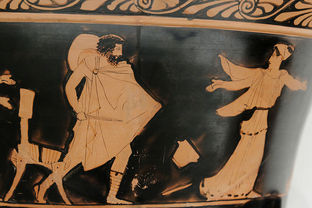CIRCE
(Kirke)

Odysseus chasing Circe, c. 440 BCE
S. A. Scrull
Greek Mythology Systematized (1880)
This celebrated sorceress lived in the island of Aeaea, and was attended by four nymphs. Her magical power was exhibited in turning into swine all who approached her island, and she exercised it by offering to her victims a draught of cordial which had power to work the transformation.
Associated Myths.
Ulysses sent some of his companions to explore the island, and they met the usual fate. Hermes prepared Ulysses to resist Circe's power by giving him an herb which could counteract the effect of the draught. Ulysses drank the cordial offered him, and Circe touched him with her wand, expecting to change him as she had the others; but he drew his sword and threatened to kill her unless she restored his friends to their proper form. This was done, and after that Circe treated them with great kindness for a whole year.
During his sojourn in this island Ulysses visited Hades to consult the seer Tiresias; he also saw and conversed with Achilles and Agamemnon.
John Bell
Bell's New Pantheon (1790)
CIRCE, daughter of Phoebus, by Persis, daughter of Oceanus. She was the most skilful of all sorceresses. Her first husband was king of the Sarmatae, whom she poisoned, as also several of his subjects, to try the effects of her skill, and prove the force of her poisons; for which she was expelled the kingdom. Sol carried her in a chariot to a promontory on the coast of Tuscany, afterwards called the Cape of Circe; here she fell in love with Glaucus, one of the sea deities, but he preferring Scylla, Circe, impatient of such a rival, turned her into a sea-monster, by poisoning the waters she used to bathe in. Picus, king of the Latins, her next favourite, for rejecting her addresses, was changed by her into a wood-pecker. The most remarkable of Circe's adventures was with Ulysses: this prince, returning from Troy, was shipwrecked on her coast, and his men, by a drink she gave them, were transformed into brutes. Ulysses himself was preserved by Mercury, who gave him the herb moly to secure him from her enchantments, and instructed him, when she attempted to touch him with her wand, to draw his' sword, and make her swear by Styx that she would use him as a friend, otherwise he would kill her. Ulysses following this advice, escaped the potent effects of her charms, and procured for his companions the restoration of their shapes.— During his abode with Circe, she bore him two sons, Agrius and Latinus. Circe had a sepulchre in one of the isles called Pharmacusae, near Salamis. Some writers contend, that Circe was no other than the Egyptian Isis, whose Horus, or attending image, every month assuming some different form, as, a human body, with the heads of a lion, dog, serpent, &c. gave rise to the fable of her changing men by her enchantments into animals : hence the Egyptians gave her the name of Circe, which signifies the aenigma. Boccace, in his Gencology of the Gods, mention's two Circes, who, afterwards, came to be confounded: she whom Diodorus from Hesiod, calls the daughter of th,e Sun, was much more ancient than Ulysses, since she lived in the time of the Argonauts, and was sister of Aetes. The other, whose court Ulysses visited, and who reigned over the coasts of Italy about the time of the Trojan war, was daughter of the former Circe, granddaughter of Elius, and sister of Aetes, the second. As few authors distinguish these two Circes, and the two Aetes, kings of Colchis, it is not to be wondered that the fable is obscure.
Source: S. A. Scull, Greek Mythology Systematized (Philadelphia: Porter & Coates, 1880); John Bell, Bell's New Pantheon; or, Historical Dictionary of the Gods, Demi-Gods, Heroes, and Fabulous Personages of Antiquity, vol. 1 (London: British Library, 1790).
Photo credit: © Marie-Lan Nguyen / Wikimedia Commons.



